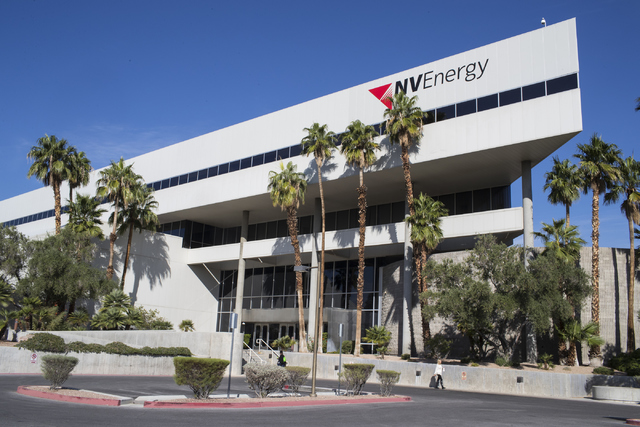No rate increase for Nevada Power residential customers for 3 years

CARSON CITY — If no news is good news, then residential customers of Nevada Power should be pleased with a rate filing due to state utility regulators on Monday.
NV Energy’s triennial general rate review application has no proposed increases for its Southern Nevada residential customers for a three-year period beginning Jan. 1, 2018.
The utility said in information provided to the Las Vegas Review-Journal ahead of the filing that should the application be approved by the Nevada Public Utilities Commission, an average residential bill in Southern Nevada would be approximately the same as it was in 2008.
“We would not have made this filing if we weren’t legally required to do so, because we are not asking for any more money to run our core operations,” NV Energy President and CEO Paul Caudill said. “We understand that our customers run their homes and businesses on a budget, and my NV Energy colleagues and I are committed to doing the same.”
The typical residential customer in Nevada Power’s Southern Nevada territory uses 1,110 kilowatts a month on average with a bill totaling $136.37.
The rate filing due Monday does not address the company’s future energy needs. Instead, it relates costs associated with Nevada Power’s investments in distribution, transmission and generation facilities and a return on those investments, and associated operating and maintenance expenses and taxes.
The filing will be reviewed by PUC staff and potentially other parties, such as the Bureau of Consumer Protection.
Slight drop for multifamily
Caudill said single-family residential customers will see no change in that average monthly bill, while there will be a slight decrease in the multifamily residential class.
For the multifamily class, the average usage is 651 kilowatts per month. These users bill would see a modest decrease from $77.54 to $77.23.
Both the single and multifamily residential classes are paying rates that are at or lower than the rates they paid over a decade ago on a real basis, the utility said.
“Since we acquired the company our goal has really been to stabilize our rates for all of our customers as best we could and make our rates predictable,” Caudill said.
That is expected to hold true for the coming three calendar years, he said.
A chart included in the filing shows that Nevada Power residential customers, in 2017 dollars, were paying just over 12 cents a kilowatt hour for electricity in 2001. They were paying 12 cents in 2016.
While customers will see their monthly bills jump as summer weather arrives, an independent review of Nevada Power’s rates might provide some consolation.
The report from the Retail Energy Supply Association released in April shows that Nevada as a whole had the third-largest decrease in energy costs for residential customers from 2008 to 2016 among all states.
New wrinkle for utility
The mandatory filing comes as the utility faces a new wrinkle: the departure of large customers who are seeking their own energy supplies on the competitive market.
MGM Resorts International and Wynn Resorts Ltd. have already left, and two other companies are following suit under a 2001 law approved by the Nevada Legislature allowing them to do so: Caesars Entertainment Corp. and the data storage company Switch.
The companies must pay fees to the utility to ensure that any cost of investments by the utility affected by their departure are not borne by remaining customers.
Another uncertainty on the horizon is Question 3, which will be on the ballot for Nevada voters next year. If the constitutional amendment is approved in 2018, all Nevada Power customers, big and small, would have the opportunity to shop for an electricity provider on the open market.
Implementation of the competition measure would take several years.
Gov. Brian Sandoval has established a task force to examine and prepare for the effects of the measure should it pass, and Caudill praised the governor for doing so.
Nevada Power, part of NV Energy, is neutral on the exit applications and Question 3.
NV Energy was able to resolve its last legally required general rate review application in 2014 for no increase in revenue to fund core operations.
Also in early 2014, customers each received a portion of a one-time $15 million credit when NV Energy was acquired by Berkshire Hathaway Energy Co.
“Over the last three and one-half years, my colleagues have responded well to the challenge of reducing our operational costs while working to improve customer service,” Caudill said. “We recognize we operate in a competitive environment and we will continue to identify ways to improve operations and reduce costs for the benefit of our customers.”
Contact Sean Whaley at swhaley@reviewjournal.com or 775-461-3820. Follow @seanw801 on Twitter.












